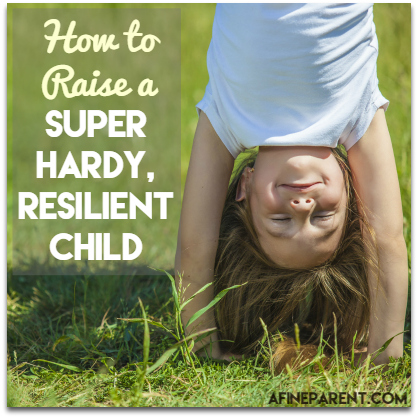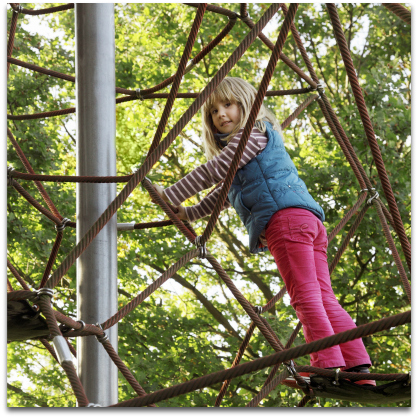 You are really good at failing.
You are really good at failing.
No, really. Do you remember the first time you fell off your bike? Failure.
What about that time you got that D on a test? Failure.
Your first kiss? Oh man, big time failure, or maybe that was just me.
See, really good at failing. Except, what makes a person good at failing isn’t the actual failure part, it’s the resiliency that comes after: picking the bike back up, studying harder for that next test, practicing on the pillow at home… oh wait, just me again.
Obviously not everyone is good at failing, but I’m willing to bet that you are. After all, you’re reading a parenting article to become a better parent. I could probably go so far as to say that failing, figuring out how to bounce back and emerging a better person for it are a part of your DNA.
So, here’s the question then: How can you pass this on to your child? How can you teach your child to be good at failure? How can you raise a hardy, resilient child who can face pretty much anything and come out the other end a heck of a lot stronger?
Raising a Resilient Child: The Epiphany
I remember my first experience with it very well. My oldest was two. I was watching her from the park bench and nursing her newborn brother when she fell and scraped her knee. I could see there was no blood, and she wasn’t going to need any first-aid, but I still felt torn as her little eyes welled up with tears.
“Mommy come kiss!” she pleaded.
I didn’t respond. How do you kiss a knee and breastfeed at the same time?
“Mommy kiss!” she repeated.
Necessity is the mother of all invention.
“Can you give it a kiss better?” I asked. That was her first lesson in resiliency.
Her little head cocked to the side as she pondered my question. The tears stopped. In a flash, she had kissed her own knee and was back on the playground as if nothing had happened.
At first, I felt guilty for my inability to be in two places at once, but after thinking about it I started to feel pretty good about myself and the inadvertent resiliency training I was doing. Of course, as I would quickly learn, there’s a lot more to teaching resiliency than simply kissing your own knee.
Here are some of the other things I’ve learnt along the way about raising a resilient child-
1. Let Them fail
We’ve all heard it, don’t be a helicopter parent, failure is good for your children, don’t always swoop in and save your kids. It’s such a popular sentiment right now it’s nearly cliche, but the research backs it up.
For example, there’s this study about how children of helicopter parents are more likely to be depressed and anxious in college. Or this study about how over parented children have more social problems and poorer family environment. Search overparenting in ebsco host, an online research database, and you’ll find 315 peer reviewed results, and every one that I read indicated that failure is good for kids.
So how do we allow failure? That depends on a child’s age.
Preschooler:
 Allow your child to climb a tricky piece of playground equipment without letting them see your anxiety. I always silently assess playground equipment and ask myself what is the worst injury my child could receive if she fell. As long as that injury isn’t life threatening, I stand back and let her go.
Allow your child to climb a tricky piece of playground equipment without letting them see your anxiety. I always silently assess playground equipment and ask myself what is the worst injury my child could receive if she fell. As long as that injury isn’t life threatening, I stand back and let her go.- Allow your child to go on a playdate with a friend who was previously unkind.
- Let your child try new tasks by herself (buttons, zippers, turning the pages on a book). Here are 50 simple age-appropriate tasks you can start with.
Grade Schooler:
- Let your child lose at a board game instead of giving him a pretend win.
- When a child leaves homework at home, don’t bring it to school for him. Let him get a bad grade for forgetting it.
- When a child loses a sports game instead of saying “better luck next time” try saying “the other team played better” followed up with, “what do you think you could work on to play as well as them?” then leave it alone. If it’s important to him he’ll practice more. There’s no need to nag.
Middle/High Schooler:
- When a child has trouble with a teacher, let her take care of it (within reason). Even if you feel the teacher is wrong, don’t immediately side with your child. Someday she will have a manager who she feels is wrong and she will already have the resilience skills to handle it.
- Help your child identify why she failed. “Why do you think you got a D on your test?” and don’t let her blame the teacher or someone else. “Were you paying attention in class?” “Did you get your homework done?” “Do you need to spend extra time with the teacher after school to understand the material?” “If your teacher really does not like you, how can you work around that?” This one is tough because there is a fine line between asking the right questions and criticizing. Thread the line carefully so your kids will continue to come to you when they are in trouble.
- If your child isn’t chosen for an award, or the team, or the top choir, etc., don’t blame the chooser. Instead, let your child experience the discomfort of not getting what she wanted or worked hard for. It is not going to be easy for either of you, but this skill will serve her well for the rest of her life.
Did that list make you a bit uncomfortable? That’s OK. Family Researcher and BYU instructor Heather Johnson said in an interview with Studio 5 that we should be asking ourselves this question, “Is what I’m doing right now helping to raise a responsible adult?” If the answer is yes, then a little discomfort is OK.
2. Let Them Feel
When my daughter came home from a play date and told me that her friend didn’t want to play with her, I wanted to ask her a million questions, and I wanted to give her advice about how to handle it when friends are mean… and unfortunately, that’s exactly what I did.
I don’t know how much she heard, but I do know that it would have been more effective to let her talk to me, tell me how she felt, and describe how she handled it.
Or, if she needed to think about it before talking to me, I could have let her be quiet. I should have let her work through her own feelings before jumping in and trying to fix it for her.
I’ve learned through a lot of trial and error (and failing!) that the general rule of thumb is, if we are talking more than our kids, we aren’t allowing them to express and experience their own emotions. Practice active listening and focus on helping them process through their feelings and emotions at their own pace. Your presence and guidance are essential. Heavy handed advice and prepared solutions aren’t.
3. Help Them Find an Empowering Narrative
 This one comes from my husband’s homework. He is currently in a doctorate program for mental health nurse practitioning. He told me about complex systems theories and how they are starting to apply them to the field of mental health.
This one comes from my husband’s homework. He is currently in a doctorate program for mental health nurse practitioning. He told me about complex systems theories and how they are starting to apply them to the field of mental health.
The basic idea is that we all have our own narrative, our own personal story, that defines who we are. When we fail at something our narrative can become focused on that failure.
This particular therapy suggests that instead of talking and talking and talking about our failure (as psychologists often did in the past) we should find another aspect of our life that we have the ability to excel with and spend time working on that.
This builds our personal narrative around our strengths instead of our weaknesses. The cool part is when people do this, they take their new sense of empowerment and apply it where they have failed in the past ultimately finding a way to succeed.
Here’s an example of how this can be applied in resiliency training. Let’s say you have a child who is struggling to read but excels in sports. Give plenty of encouragement at games and maybe find a kinesthetic method to teach reading. Pick out a time when she overcame a hurdle and still succeeded at her sport and use that as the background narrative when she fails at reading. Encourage. Incorporate humor. Build an empowering narrative.
This isn’t a magical fix for reading, but it’s a good way to teach your budding sports star how to handle not being the best at everything. It will help her build her personal narrative around something she’s good at rather than focusing on what she struggles with.
4. Find the Right Balance between Routine and Free Play / Down Time
Routine is important. It helps kids settle down before bedtime and come back online without fuss in the morning. It puts important functions on autopilot (brushing teeth, finishing homework, basic hygiene etc. I’m currently teaching a painfully obvious wipe wash flush routine to my preschooler). And it can help kids feel secure.
At the same time, giving kids unstructured free time is equally important. Studies show that free play can have a huge impact when it comes to a child’s emotional development. During free play kids mimic adults, pretend their way through difficult emotions, and practice taking risks.
Have you ever noticed how dramatic free play can be? That’s because kids are learning about emotions when they are pretending.
For example, my daughter can’t pretend to drive an airplane without a horrible plane crash. If I try to play along with things that will save us, she always finds a new dramatic twist.
“But look, we have parachutes!” I’ll say.
“Oh no! The parachutes have holes!”
“I see an ocean and a boat below.”
“The boat is sinking!”
“Good thing we know how to swim.”
“Look mommy, sharks!”
Before I understood that this was part of normal development, I was so scared that I might be raising an attention-seeking drama queen!
It is important that we find that right balance between routine and free play for raising a resilient child. Every child is different and while one might crave more structure, the other might flourish in more freedom. Adjust your balance to each of your child’s temperament and growing needs, allowing them to experiment and fail in a safe environment.
5. Communicate
 Communication is a valuable skill. I think most of us recognize that it’s a two-part process involving both talking and listening. We also know who is supposed to do more listening in the parent child relationship, but what else can we do to teach our kids to communicate and why is it important for raising a resilient child?
Communication is a valuable skill. I think most of us recognize that it’s a two-part process involving both talking and listening. We also know who is supposed to do more listening in the parent child relationship, but what else can we do to teach our kids to communicate and why is it important for raising a resilient child?
Well, dealing with the ups and downs of life isn’t easy for our kids, and if we teach them to communicate effectively, they won’t have to do it alone. Here are a few key communications skills that will help our kids be more resilient.
Teach Them to Ask for Help
Asking for help is a learned skill. In fact, research shows that students from working class families are less likely to ask for help in the classroom. Remind your child that they can ask for help and be a good example for them.
Knowing that you sometimes need help too might be the encouragement they need.
Teach Them How to Accept Criticism and Feedback
Remind your child that criticism (as opposed to bullying) is not personal. If a teacher marks a problem wrong, it does not mean the teacher dislikes you or thinks you aren’t smart. It just means you got the problem wrong and need additional help.
Teach Them to Listen
There are a million articles on how to talk so your child will listen, but the onus doesn’t always have to be on the way we talk — we also need to teach our kids how to listen.
I still remember the first time my dad gave me a lesson in listening. He was generally not critical so when he gave me instruction it stuck.
This particular occasion occurred when I was around five and he told me it was rude to not look someone in the eyes when they were talking. I had never thought about that before and I found my listening skills (at least in my young mind) improved right away.
Another instruction that is useful to kids (and sometimes adults) is to learn how to listen without interrupting. Basic skills like this will enable our kids to listen and learn from others, perhaps even those who have failed or succeeded where our kids are currently failing and succeeding.
If we are intentional, we can teach our kids to fail like a pro, and hopefully that means they’ll grow into resilient adults.
Of course, we will face hurdles in this venture, and in our parenting in general, and that’s OK. Because it all works out… we get to show our kids by example how to try again. When we own our parenting mistakes and make changes, they will respect and respond to those changes.
The 2-Minute Action Plan for Fine Parents
For our contemplation questions today, take quick stock of where you stand right now, when it comes to teaching your kids to be resilient.
- How do your kids respond to failure right now? What is their attitude towards difficult situations where the outcome may not be in in their favor?
- Does your child have an empowering narrative? How can you help them expand on it?
- Are you a good listener? Are you modeling good listening for your kids?
- Do your kids effectively communicate their needs to you and ask for help when they need it?
The Ongoing Action Plan for Fine Parents
Take a step back and think before acting this week. Ask yourself Heather Johnson’s question, “Is what I’m doing right now helping to raise a responsible adult?”
Emphasize your kids’ strengths, try to find time to encourage and enjoy them doing what they are good at.
At the end of the day take a moment and ask yourself if you have the right balance between free play and routine.
Ask yourself how you can listen more and talk less.


You know, I read that it’s worth letting the children make mistakes and remembered themselves when the first child was still a schoolboy. I wanted to protect him as much as possible from the impact of society, to help him avoid failures and falls. I did not let him live his life. And when the son went to study at the university, it was difficult for him to join on students world. Thank you for sharing your experience. Perhaps this will save many parents. And they will not make such stupid mistakes as me.
I’ve worked with so many parents in my career as a child care provider turned child counselor and something I hear so often is, “I just want my kid to be happy!” Parents seem to want to protect their kids from so much of the natural bad that happens in this world that kids are emerging in kindergarten having rarely experienced a slight bump in the road, frustration or a major need of any kind. I regularly encourage my parents to expose children to things that will make them frustrated so that they can help the child to figure out how to deal with frustration, versus avoiding frustrating activities all together. I don’t always get a welcoming smile from parents when I do this!
Thanks for writing about all 5 of the ways that you can raise resilient children. While allowing them to fail was my favorite part, I enjoyed all of it!
Thanks for your comment Emily! I completely understand the sentiment behind just wanting your kids to be happy, but I try to think of everything I do in a long term sense. Sometimes a little failure now can mean potential for greater happiness down the road.
This is a clear, well-written and most useful post! Thank you Amber!
Great post thank you Amber. My little guy is two but he’s always looked at least 6 months older than he is, he’s really tall. I struggle with the “helicopter” parenting label when we’re at the playground as I’m sure other parents think he’s more capable than he is. Sometimes I think it goes too far in the other direction. But I agree it’s so important to let them have a go and take a fall if that’s what happens. I love the list in the link to the age appropriate tasks – will come in handy. And I’ve just started noticing my son really working through his feelings and events that have happened – we talk about them over and over for days. It’s super cute and encouraging to see him working through how he feels. The latest was when I dropped his smoothie on the road – that one went on for days, talk about Mummy guilt, ha ha! Thanks again 🙂
That is so cute Tracy! I can just imagine a two-year-old repeatedly bringing up his spilled smoothie. Oh man. He’ll forget about it, but I bet you won’t! ha ha 🙂